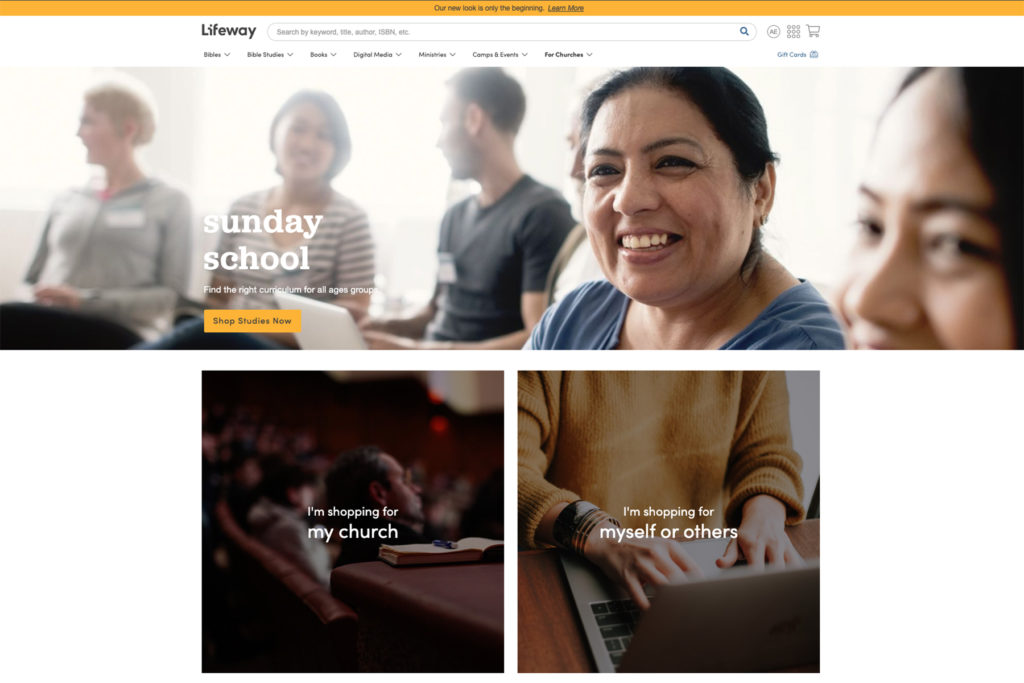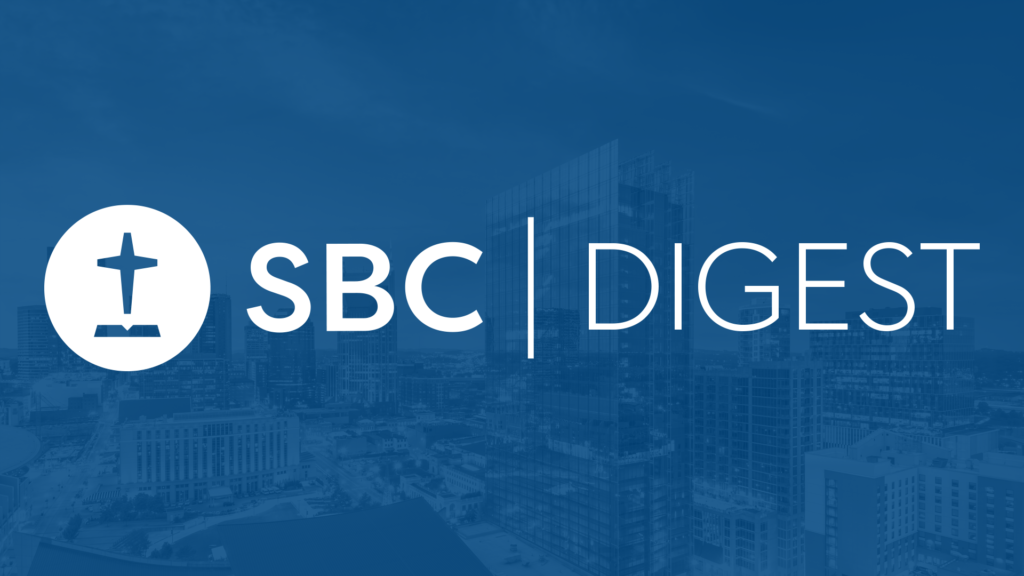
Lifeway recognized on Newsweek’s Best Online Shops List
By Carol Pipes/Lifeway
NASHVILLE (BP) – Lifeway Christian Resources has been recognized on Newsweek’s list of Best Online Shops 2022. Lifeway landed at No. 5 in the category of media (books, CD, DVD, software, etc.).
 “This recognition reflects the hard work by our IT and Marketing teams to improve the user experience at Lifeway.com and to refresh our brand. Both of these have been priorities for Lifeway as we focus on the needs of our customers,” said Lifeway President Ben Mandrell. “We know it’s important for church leaders to find just the right resource at the right time in their ministry.
“This recognition reflects the hard work by our IT and Marketing teams to improve the user experience at Lifeway.com and to refresh our brand. Both of these have been priorities for Lifeway as we focus on the needs of our customers,” said Lifeway President Ben Mandrell. “We know it’s important for church leaders to find just the right resource at the right time in their ministry.
“We’ve taken our customers’ feedback and have been making much-needed improvements to our website. We want to do everything we can to make it easy for church leaders to find the ministry resources they need to be more effective in the work they do.”
Jamie Adams, Lifeway’s chief information technology officer, said providing a frictionless and personalized experience is part of a broader strategy to simplify and improve the customer’s online journey. She said over the past year, Lifeway has made significant site improvements to help customers find the products and services of interest to them and to speed up the checkout process. Adams also said Lifeway added a new auto-ship feature for additional convenience.
“All of these have contributed to a better customer experience, but it’s just the beginning,” Adams said. “Customers will continue to see website improvements and new features in the coming months.”
Creative Director Christi Kearney said when the team began work on the site redesign, they started at square one and reframed how they thought about visitors to the site.
“People are much more than users,” Kearney said. “We wanted to elevate the visitor to more than that – the people who come to our site are heroes. We know ministry leaders are busy, they have a lot on their plate, and they want to reach their desired goals quickly. Every enhancement we made was in the service and context of our heroes: we simplified journeys, elevated intent, clarified and strengthened messaging, aesthetics, design and experiences to feel intuitive, modern and mission-focused.”
Newsweek partnered with market research company Statista to identify top online shops. Statista performed detailed testing of each online shop and conducted a nationwide survey of approximately 6,000 American online shoppers.
Survey participants were asked to evaluate online shops on trust and security, structure and usability, payment, purchase and delivery, service and communication, technical performance, and likelihood of purchase. Out of the thousands of online retailers Statista evaluated, only 1,000 have been awarded among eight industries and 39 different categories.
To see the full list of Best Online Shops 2022, visit Newsweek.com/best-online-shops-2022.
Longtime Southern Baptist Foundation employee Christine Bess dies
By BP Staff
NASHVILLE (BP) – Christine Bess, who worked for the Southern Baptist Foundation for 36 years, died Oct. 27 at the age of 100.
 Bess began with the Foundation’s second president, Charles Bolton, in 1950 and helped develop an accounting system in a time before computers.
Bess began with the Foundation’s second president, Charles Bolton, in 1950 and helped develop an accounting system in a time before computers.
The Foundation, established in 1947, helps people financially support Christian causes through services including out-right gifts, trusts, wills, deeds, gift annuities or donor advised funds.
In a 2007 interview, Bess said when she thinks of the Southern Baptist Foundation, the three words that come to her mind are support, strength, and permanence.
“There’s not one thing in life I consider permanent,” she said, “But to me, the Southern Baptist Foundation is a permanent establishment because we have committed to doing what we can with what left to us. There is strength in serving. The heart and soul of the Southern Baptist Foundation lies in those who presently and previously have given their time and effort in knowing and believing the Foundation is a permanent trust placed in the hands of the dedicated people to make it tick – now and forever.”
Passionate about Baptist history and always active in Baptist life, Bess served on the Baptist Sunday School Board for four years, the Tennessee Baptist Convention for two years, as well as the Executive Committee and Committee of Nominations.
“The Southern Baptist Foundation, next to my family, expresses many happy years of my life,” she said. “It continues to have a strengthening factor in my life as I reflect on the past, continue to live in the present, and hold fast to the promised land.”
Bess is survived by her son, two grandchildren and several great-grandchildren.
Some churches paid back PPP loans
By Bob Smietana/RNS
(RNS) – When Michigan’s governor required churches to stop meeting in person on March 16 last year, Kenton Sanders, director of operations at Mars Hill Bible Church, quickly did some worrying math.
About 40 percent of donations to the megachurch in Grandville, Mich., came during in-person services that drew some 1,750 adults, students and children weekly. With in-person services shutting down, donations would surely tumble. If that happened, the church would have to lay off some of its staff.
“It was at the beginning of the pandemic, we had just gone online, and had no idea what was going to happen,” he said.
So, like more than 120,000 churches and other religious organizations nationwide, Mars Hill applied for help through the Paycheck Protection Program, the emergency loan program created by the CARES Act, a $2.2 trillion relief and stimulus package passed by Congress in March 2020. Under the PPP, the Small Business Administration would funnel funds to local banks, which would make loans to employers in their communities.
Mars Hill’s $295,000 loan, approved on April 14, 2020, would protect two dozen jobs at the church, at least for a few months.
But within a month after the loan was approved, Sanders noticed that giving had actually gone up. In addition to regular offerings that came in online, church members also contributed to a benevolence fund, known as “the white bucket project,” to help neighbors in need during the pandemic.
After talking with other Mars Hill leaders, Sanders called up the bank and returned the entire amount of the loan.
Mars Hill is one of a small number of religious organizations that took out large PPP loans only to return the funds without ever withdrawing a penny or to pay back the loan back in full. According to an analysis by Religion News Service of data from the SBA, 13,408 religious groups, mainly churches, were approved for loans of $150,000 or more. Of those, 100 paid the loans back without asking for the loans to be forgiven. Fewer than 50 other groups were approved for the loans but did not withdraw the funds.
The repaid loans range from $4.37 million to $150,500 and totaled just over $66 million. Those repaying the loans include 99 Christian groups and one Muslim organization.
For Philadelphia Baptist Church, a Southern Baptist congregation based in Deville, La., getting approved for a PPP loan provided peace of mind when such peace was in short supply. Pastor Philip Robertson called the early days of the pandemic the most stressful time of his more than quarter-century as a pastor.
While the church had some reservations about the loan and whether it would come with government strings attached, Robertson said, “We wanted to make sure that we were able to continue to pay our staff and not have to endure catastrophic financial implications.”
From the beginning, church leaders decided to pay the $181,170 loan back if they could. The funds were set aside, said Robertson, and to be spent only if they were needed.
When giving remained steady, the church repaid the loan in July of 2020. Paying the loan back cost the church about $400 in interest, said Robertson, a small price to pay for the peace of mind that came with the loan.
Robertson, who also serves on the SBC Executive Committee, said he’s thankful that the church was eligible for the loan — even though it was funded by the federal government — grateful that the loan turned out not to be needed and grateful for the continued giving of church members.
“The people of God give because they give out of obedience to the Lord and wanted to support the ministry and work of their church,” he said. “And that was a priority for them. Even in the midst of a global pandemic.”
To qualify for loan forgiveness, churches and other organizations had to certify that there was significant economic uncertainty when they applied for the loan — which was the case for nearly every for-profit and nonprofit organization in the United States.
There are some indications that congregations avoided major fiscal decline during the COVID-19 pandemic. More than half of the congregations in a fall 2020 study from Lake Institute on Faith and Giving at Indiana University-Purdue University Indianapolis said that giving had either stayed the same or gone up. Few (14 percent) said they had to lay off staff, while two-thirds applied for a PPP loan.
In their loan application, Mars Hill asked for enough money to pay the salaries of 24 staffers. All told, the PPP loans to religious groups were meant to pay salaries of 1.5 million staffers, with half of them at groups that borrowed more than $150,000.
Uncertainty for many religious organizations, meanwhile, is far from over. At Mars Hill, Sanders said that the staff remains intact, and as the pandemic has eased, about 300 people now show up for weekend services. But others continue to attend only online. That makes long-term planning difficult.
“The hard part is that we don’t know how many people we have in our church anymore,” he said.
Still, he is thankful the PPP loan was repaid. “I am really proud to be part of a church that said, ‘No, we don’t need it – we are going to give it back.’”
















